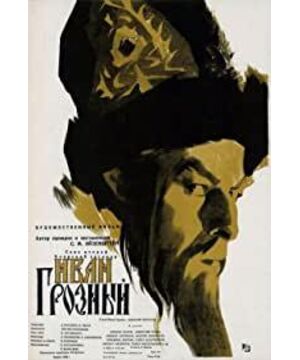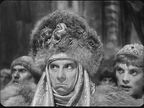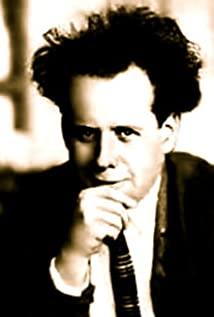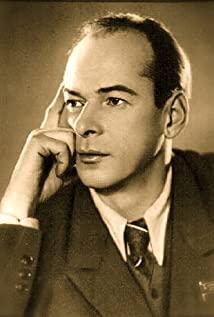Comrades Stalin, Molotov, and Zhdanov were sitting in the far back of the office. We greeted them when we entered the house and sat down at the table.
Comrade Stalin said:
You wrote a letter. A little late to reply today. I wanted to give a written reply, but I thought it would be better to talk about it. Since I was very busy and had no time, it took a long time to decide to meet here. I received your letter in November.
Zhdanov: Yes. You received this letter in Sochi.
Stalin: Have you studied history?
Eisenstein: Kind of.
Stalin: Kind of! I don't know much about history either. Your characterization of the Praetorian Guard is incorrect. The Praetorian Guard was the army under the direct control of the Tsar. In order to be different from the feudal lords' army, which may roll up the flag to strike at any time, a regular army, a progressive army, was established. You play the Guards like the Klan.
Eisenstein: The Ku Klux Klan wore white pointed hats, and our Praetorian Guards wore black pointed hats.
Molotov: There is no difference in principle.
Stalin: You played the Tsar as an indecisive man, like Hamlet. He is always told what to do. rather than making his own decisions.
Tsar Ivan was a great and wise ruler, and if you compare him with Louis XI (have you read the book about Louis XI laying the foundations of the despotism for Louis XIV?), then Ivan the Terrible is like Louis XI. Can't be compared. Ivan the Terrible was wise in that he always stood on the national standpoint and did not allow foreigners to enter his country. This prevents foreign influences from penetrating into the country.
There are some deviations and mistakes in this regard when it comes to portraying Ivan the Terrible.
Peter I was also a great monarch. But he was too indulgent to foreigners, opened the door too wide, allowed foreign influences to infiltrate the country, and allowed Russia to be Germanized. Ekaterina went further in this regard. Looking back, was the court of Alexander I the court of Russia? Could it be Nicholas I's court-like Russian court? No, their court was the German court.
A commendable measure taken by Ivan the Terrible was that he was the first to implement a foreign trade monopoly. implement this system. Ivan the Terrible was the first, Lenin was the second.
Zhdanov: Eisenstein's Ivan the Terrible became a nervous breakdown.
Molotov: Generally speaking, the film focuses on psychological descriptions, with a strong emphasis on inner contradictions and personal feelings.
Stalin: The style of historical figures should be properly represented. For example. In the first episode, Ivan the Terrible kisses his wife for a long time, which is unreal. This was not allowed in those days.
Zhdanov: The film has Byzantine tendencies. And that didn't exist at the time.
Molotov: There are vaults and basements everywhere in the second episode. Neither the prosperity of Moscow nor the shadow of the people can be seen. Showing conspiracy, repression is okay, but it shouldn't be limited to that.
Stalin: Ivan the Terrible was an extremely cruel man, and it is okay to show his cruelty. But it should be explained why it is cruel. One of Ivan the Terrible's mistakes was not completely eradicating the five feudal families. If he eliminated these five major families, there would be no chaotic period at all. And Ivan the Terrible, no matter who he executed, he always regretted and repented endlessly. It was God who stood in his way in this regard. Should be more decisive.
Molotov: Historical events should be correctly reflected. Take, for example, Jamian Bedny's play "The Warriors". Jamie Young Biedner mocked Ross's baptism in the script, while actually accepting that Christianity was a progressive phenomenon at that historical stage.
Stalin: Of course, we are not devout Christians. But the progressive role of Christianity at a certain stage cannot be denied. This event is of great significance because it shows that the Russian state is beginning to integrate with the West, rather than developing towards the East.
Comrade Stalin, when talking about relations with the East, said that Ivan the Terrible was eager to unify Russia, which had just been freed from the shackles of the Tatars, in order to make it a bulwark against possible Tatar invasions. Although Astrakhan was conquered, it could attack Moscow at any time. The Crimean Tatars probably did the same. Demyan Bedny's estimates of historical prospects are inaccurate. When we started work to move the monument to Minin and Pozharsky next to the Cathedral of the Assumption of Vasily, Demyan Bedny objected and wrote to me (Comrade Stalin pointed to himself) saying that it should not be kept at all Monument, Minin and Pozharsky should be completely forgotten. In my reply to him, I called him "Ivan who has forgotten his ancestors." We cannot delete history.
Then Comrade Stalin made some comments on the handling of the image of Ivan the Terrible. He said that Malyuta Skuratov was an outstanding officer who died heroically in the war with Livonia.
Comrade Cherkasov talked about the usefulness of criticism and Pudovkin made a good film "Admiral Nakhimov" after criticism: "We believe that we will do equally well, because I not only I have created the image of Ivan the Terrible on the screen as well as on the stage, I have fallen in love with this image, and I think the screenplay we adapted can be said to be accurate and true."
To this Comrade Stalin replied: All right , then try it.
Cherkasov: I believe that the adaptation will be successful.
At this time Comrade Stalin said: "May God bless us all the best" (laughs).
Eisenstein asked Stalin what other specific instructions he had for the film.
Comrade Stalin replied, "I am not giving instructions to you, but speaking as an audience member."
Comrade Zhdanov said that Eisenstein liked shadows too much, and he used Ivan the Terrible's beard to divert the audience's attention from the plot. He raised his head again and again.
Eisenstein promised to cut Ivan the Terrible's beard short in the future.
Comrade Stalin, speaking of some of the actors in the first episode of Ivan the Terrible, said:
"Kurbsky did a great job. Staritsky (played by Kadochnikov) did a great job, too. He's really good at catching flies. He's going to be a tsar, and he's catching flies with his hands. Flies. These details are needed, they help reveal the essence of a person."
Comrade Stalin said: Well, the problem can be said to be solved at this point. As for perfecting the theme and making the film well, it is up to Comrade Cherkasov and Comrade Eisenstein to do it.
He added: Please forward this opinion to Bolshakov.
Comrade Cherkasov asked for his opinion on the details of the film and on the appearance of Ivan the Terrible.
Stalin: Appearance conforms to reality, there is no need to change. Ivan the Terrible looks good.
Cherkasov: Can the plot of Staritsky's assassination be preserved in the film?
Stalin: It can be preserved. Assassinations were a common occurrence in the past.
Cherkasov: We have Mariuta Skuratov strangling Metropolitan Philip in our script. Do you need to keep this plot?
Stalin: Keep this plot. This is true from a historical point of view.
Molotov said: Repression in general can and should be manifested, but it should be shown why and why. To this end, state affairs should be shown, not just the plots in basements and secret rooms, but wise state affairs.
Cherkasov talked about his own ideas on the adaptation of the script in the future.
Stalin asked how the end of the film would be handled. How to make it better, because there are still two episodes, the second and the second, or whatever we think about it.
Stalin: How will your film end?
Cherkasov said that the end of the film will be handled as: Livonia is defeated, Malyuta Skuratov is sacrificed, marching to the sea, Ivan Ray The emperor stood on the seashore and said to the soldiers around him, "We have already established ourselves on the sea, and we will continue to do so."
Stalin: This ending fits the facts. I'm afraid it's not enough.
Cherkasov asked whether the draft of the script would need to be reviewed and approved by the Politburo in the future.
Stalin replied: The script does not need to be submitted for trial, you can handle it yourself. Generally speaking, it is difficult to judge just by looking at the script. It's easier to talk about the film made.
Stalin said to Molotov: You must especially want to read the script
, Eisenstein said, it would be better if no one urged him to make the film.
This opinion aroused enthusiastic responses from all the people present. Comrade Stalin said:
"In any case, don't rush for success, and we will hold back any hastily produced films. Repin's "Zaporizhia". "People" was painted for 11 years."
Everyone unanimously came to the conclusion that only long-term labor can really make a good film.
Comrade Stalin said to the film of Ivan the Terrible that if the film needs to be made for one and a half to two years, or even three years, then you should do it according to this time limit, as long as the film can be made well, as long as the film can make it "Fine Carved" will do.
Comrade Stalin said: In short, we should now improve the quality. The film can be made less, but the quality is high.
He said that Tserikovskaya played the other roles well. Her performance is great, but she's a ballerina.
We said it was impossible to get another actress from Moscow to Almaty.
Comrade Stalin said that a director should have tenacity and demand to do everything he needs, and our directors often give up their demands too easily.
Comrade Eisenstein said that he had been looking for Anastasia for two years.
Comrade Stalin pointed out that the actor Varov's attitude towards his role in the film Ivan the Terrible was not upright, not serious, not like a dignified officer.
Comrade Zhdanov: This is not Maliuta Skuratov, but a random man in a top hat.
Comrade Stalin said that Ivan the Terrible was a tsar with strong national consciousness and a visionary person. He did not allow foreign influence to penetrate into Russia, "Petruha has opened the door to Europe. Too many foreigners have been put in".
At the end of the conversation, Comrade Stalin wished everyone success and said: "May God help you".
We shook hands and said goodbye. The conversation ended at 00:10.
Here are a few additions:
Comrade Zhdanov also said that there are too many religious ceremonies in the film.
Comrade Molotov said that this created a certain mystique, which should not be so exaggerated.
Comrade Zhdanov went on to say that the scene of "Salvation in the Furnace" in the cathedral was too big and distracted people's attention.
Comrade Stalin said that the dancing praetorians were filmed like savages and gave the impression of some resemblance to the Phoenicians and Babylonians,
when Comrade Cherkassov said that he had been in the film for many years When playing the role of Ivan the Terrible on the stage, Comrade Zhdanov said, "I have been a tsar for more than 5 years."[1]
Comrade Cherkasov asked when he reached for a cigarette case Comrade Stalin: "Can I smoke?"
Comrade Stalin said: "It seems that the decision to ban smoking has not been made yet. Are we going to vote by show of hands?" He indicated that smoking was allowed.
Addendum (about the script).
Comrade Molotov said that the
script does not need to be submitted for approval, and Comrade Eisenstein has probably given thorough consideration to all the questions about Ivan the Terrible during this period of time.
Stalin asked about Eisenstein's heart condition and said he looked very good.
[1]. This is a monologue in Pushkin's play "Boris Godunov".
February 25, 1947
Xie Eisenstein, N. Cherkasov records sorted
out in Selected Historical Archives of the USSR Vol. 13 №06448
View more about Ivan the Terrible, Part I reviews











